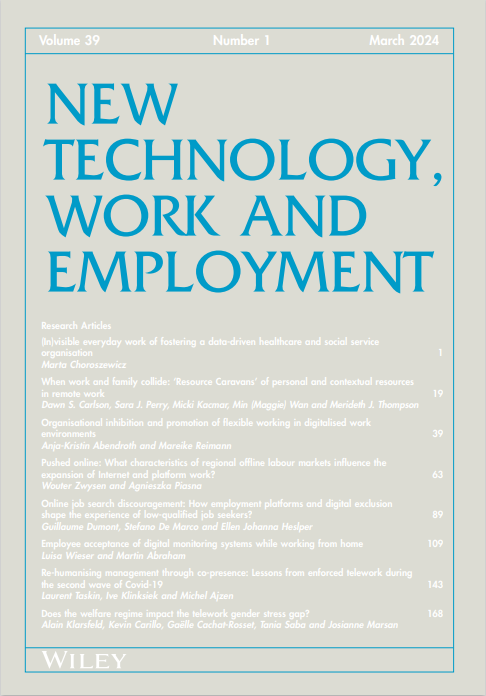Gig经济中的竞争动态:对平台、客户还是国家的愤怒?
IF 4.5
3区 管理学
Q1 ERGONOMICS
引用次数: 15
摘要
零工经济中的抗议活动有多种形式和目标(平台、客户和国家官员)。然而,研究人员尚未充分解释这种多样性。我们使用了一项针对远程零工经济中Upwork和PeoplePerHour平台工人的欧洲调查,来调查工人对不同形式抗议的取向。研究结果表明,在远程零工经济中,工人的愤怒、依赖和数字通信形成了竞争。对集体组织的支持不仅与对平台的愤怒有关,还与员工对平台的依赖以及与其他员工的沟通有关。而针对客户的个人行为只与愤怒和沟通有关,而与沟通无关,对国家监管的支持只与愤怒有关,而不与依赖或沟通有关。我们得出的结论是,尽管这些新兴的社会关系很新颖,但动员理论所包含的关系方法可以通过揭示团结和依赖改变对不公正的特定补救措施的感知成本和收益的动态过程,来帮助解释零工经济中的争论本文章由计算机程序翻译,如有差异,请以英文原文为准。
Dynamics of Contention in the Gig Economy: Rage Against the Platform, Customer, or State?
Protest in the gig economy has taken many forms and targets (platforms, customers, and state officials). However, researchers are yet to adequately account for this diversity. We use a European survey of Upwork and PeoplePerHour platform workers in the remote gig economy to investigate worker orientation towards different forms of protest. Results reveal that worker anger, dependence, and digital communication shape contention in the remote gig economy. Support for collective organisation is associated not only with anger at platforms but also workers’ dependence on the platform and communication with other workers. Whereas individual action against clients is associated only with anger and communication but not communication and support for state regulation is associated only with anger but not dependence or communication. We conclude that despite the novelty of these emergent social relations, the relational approach entailed by Mobilisation Theory can aid explanation of contention in the gig economy by shedding light on the dynamic process by which solidarity and dependence alter the perceived costs and benefits of particular remedies to injustice
求助全文
通过发布文献求助,成功后即可免费获取论文全文。
去求助
来源期刊

New Technology Work and Employment
Multiple-
CiteScore
10.50
自引率
15.50%
发文量
36
期刊介绍:
New Technology, Work and Employment presents analysis of the changing contours of technological and organisational systems and processes in order to encourage an enhanced and critical understanding of the dimensions of technological change in the workplace and in employment more generally. The journal is eclectic and invites contributions from across the social sciences, with the primary focus on critical and non-managerial approaches to the subject. It has the aim of publishing papers from perspectives concerned with the changing nature of new technology and workplace and employment relations. The objective of the journal is to promote deeper understanding through conceptual debate firmly rooted in analysis of current practices and sociotechnical change.
 求助内容:
求助内容: 应助结果提醒方式:
应助结果提醒方式:


